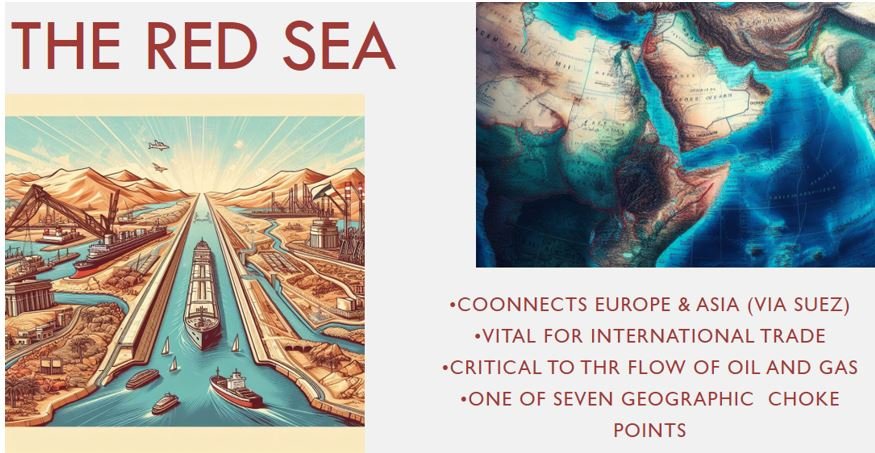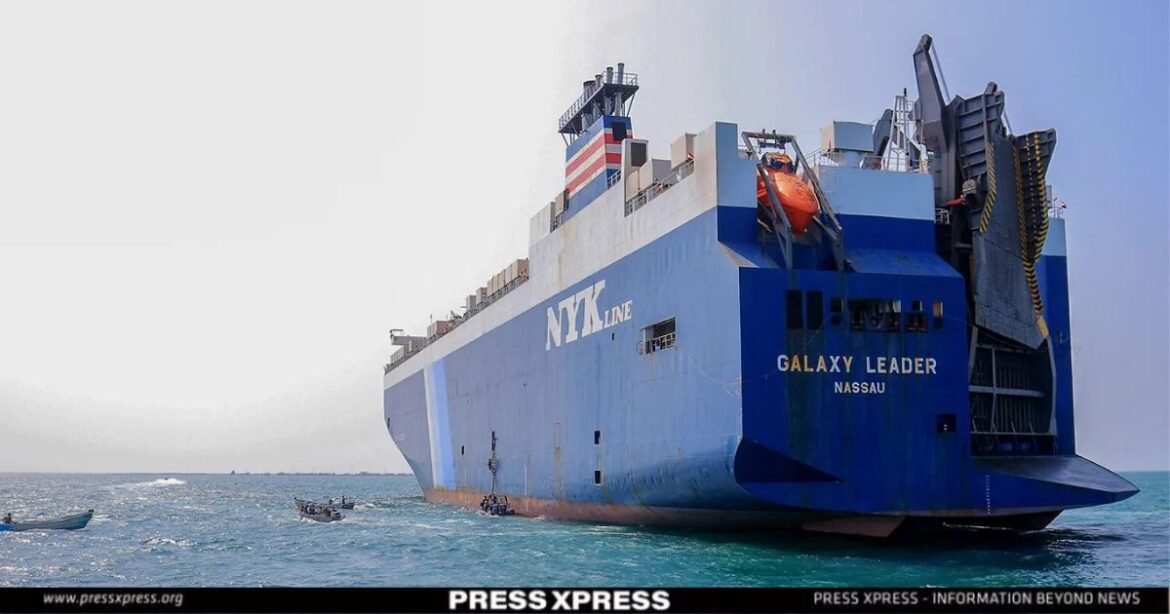The Red Sea, a critical maritime passageway connecting Europe and Asia, has long played a pivotal role in global trade and geopolitics. Referred to as the “Interstate 95 of the planet” by a US defense official, its strategic and economic significance cannot be overstated. 10% of the world’s seaborne cargo flows through the Red Sea and the route via the Suez Canal and Bab El Mandeb Strait, including a substantial portion of Asian-European trade.
Historically, this body of water has served as a vital link in a global network of waterways stretching from the Mediterranean to the Indian Ocean and the Pacific. Its centrality to maritime trade and its strategic chokepoints have attracted the attention of conquerors throughout history, from Alexander the Great to Napoleon, making it a constant subject of interest in geopolitical affairs.
The crucial waterway has recently faced increased attacks from Houthis- a military group that has Iranian backing. The group has intensified attacks on maritime traffic going through the Reed Sea. While the group claims to be only targeting ships of Israeli origin, the increased risk to global shipping has had a ripple effect on other shipping companies.
The Recent Risks to Global Trade
The escalating threat from Houthi militants in Yemen has prompted shippers to divert over $30 billion worth of cargo away from the Red Sea. Ocean carriers and companies are urgently communicating potential delays to U.S. shippers due to the Houthi threat. The Houthis, with support from Iran, have aligned themselves with the Palestinian organization Hamas in its conflict with Israel. They have attacked several ships around El Mandeb, including taking hostages and firing on ships.
In response to the security concerns, U.S. Defense Secretary Lloyd Austin has announced the formation of an international task force. Port authorities are bracing for congestion, anticipating delays of approximately 10-14 days for East Coast cargo in the U.S. This projection accounts for potential further delays if multiple ships arrive simultaneously outside of their scheduled berthing windows.
Strategic Significance and Global Consequences
The Red Sea’s importance extends beyond commerce; it acts as a military chokepoint linking the Mediterranean Sea, the Suez Canal, the Strait of Hormuz, and the Indian Ocean. This maritime domain facilitates efficient supply routes for oil and gas, trade, information cables, and military operations. For navies aspiring to transoceanic reach, the Red Sea emerges as a crucial chokepoint.
In the past decade, major nations, including China and Japan, have intensified their focus on the Red Sea region. Notably, both nations have established their inaugural overseas military bases in Djibouti, strategically positioned at the southern entrance to the Red Sea and the critical international shipping corridor, the Bab El Mandab Strait. This evolving geopolitical landscape underscores the growing global interest in the Red Sea’s strategic significance.
Economic Significance of the Red Sea and Suez Canal:

The Red Sea, in conjunction with the Suez Canal, is historically important for global trade. The route is the fastest through which goods can be transported from Europe to Asia and vice Versa. It cuts down travel time and distance and saves valuable resources in terms of fuel and cost. The geographic location also means that energy and gas from the Middle East can be transported to Europe via the Suez quickly and efficiently. The Russo-Ukrainian war has significantly increased the importance of the Red Sea, as Europe focuses on the Middle East to reduce its demand for Russian Energy.

The Suez Canal is arguably the most important economic artery in the world. The man-made canal allows ships to bypass the Cape of Good Hope. The canal is crucial for the smooth flow of global economic trade. The Bab El Mandeb Strait, a geographic maritime chokepoint lies at the exit of the Red Sea, it connects the Asian side of the Suez Canal to Europe. The civil war in Yemen and the war in Gaza have created a precarious situation. The overall situation is combustible
The recent unrest around the Bab El Mandeb Strait could further deteriorate a global economy under strain from the Russo-Ukrainian war and struggling from post-coronavirus Pandemic Recovery. A sudden partial closure or reroute of traffic would mean immense delays and a rapid surge in prices of goods as well as raw material and energy price hikes. In a highly globalized economy, this can be catastrophic as the choking of a single trade route can have a domino effect on the entire economy.
Significance to Bangladesh
Europe and the United States represent the biggest export market for Bangladesh. The lion’s share of goods that Bangladesh trades transit via the Red Sea and the Suez Canal. A crisis in the Red Sea region could, therefore, have a significant effect on our economy. Even a partial closure or slowdown of traffic through the waterway could mean significant delays and consequential losses. The potential loss could put a strain on the nation’s national reserve which is already under some strain from the Russo-Ukrainian war.
The security threats and potential disruptions in the Red Sea have far-reaching implications, not only for global trade but also for geopolitical stability and the economic well-being of nations, including Bangladesh. The global community is well aware of this threat, as well as the Houthis. The war in Gaza adds more material to an already giant pile of gunpowder. Should a spark ignite this fire, the entire region as well as the global community will feel the shockwaves from it. Therefore, the global community must launch a two-pronged effort to address this situation. The military prong could see the navies of the world launch a joint task force to safeguard maritime traffic, much like the ones that deter existing pirate activities around the region; the second, diplomatic effort should attempt to deescalate the situation to avoid any single catalytic event from spiraling out of control.


